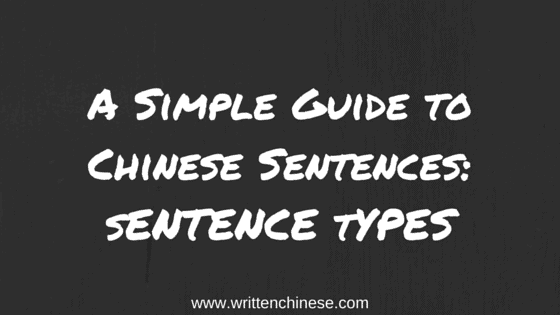Chinese Sentence Types
To follow on from our previous article A Simple Guide to Chinese Sentences: Structure, this post introduces you to the different sentence types, their elements and how to structure them correctly.
If sentences are sorted by tone or mood, there are 4 main sentence types:
- Declarative sentence 陈述句 (chén shù jù)
- Interrogative sentences 疑问句 (yí wèn jù)
- Imperative sentence 祈使句 (qí shǐ jù)
- Exclamatory sentence 感叹句 (gǎn tàn jù)
Here’s a more detailed look at these four sentence types:
陈述句 (chén shù jù) Declarative sentences
Declarative sentences 陈述句 (chén shù jù) describe or explain a fact with an indicative tone. Declarative sentences end, similarly to English with an “。”. This sentence type can sometimes end with a modal particle such as 的、了、呢、嘛、罢了、啊, etc
Examples:
他已经回家了。 (tā yǐ jīng huí jiā le.) = He has already gone home.
他说了会去的。 (tā shuō le huì qù de.) = He said he would go.
When the sentence indicates fact, there will be a positive or negative response. For an negative sentence, we commonly use a negative adverb like “不”, “没有”, “无”, “非”, etc.
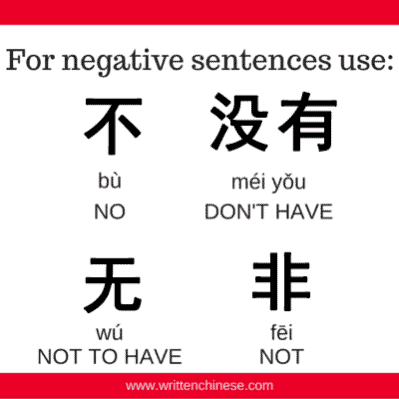
Example
我不知道呢。(wǒ bù zhī dao ne.) = I do not know.
And we will also use double negation to express an affirmative such as “不…不…”, “没有…不…”
Examples
他不得不去。(tā bù dé bù qù.) = He has to go.
没有人不参加这个宴会的。(méi yǒu rén bù cān jiā zhè ge yàn huì de.) = No one will not take part in the party = Everyone will attend the party
疑问句 Interrogative sentences
According to form and structure, there are 4 kinds of interrogative sentence. Interrogative sentences are usually questions that force a response.
1) 是非问句 (shì fēi wèn jù) yes-no sentence.
For 是非问句 (shì fēi wèn jù) sentences, we can simply use an imperative tone or add a question particle, such as 吗 or 吧.
Examples
你明天回来吗? (nǐ míng tiān huí lai ma?) = Will you come back tomorrow?
这件衣服是你的吧? (zhè jiàn yī fu shì nǐ de ba?) This is your clothing, right?
你昨天迟到了? (nǐ zuó tiān chí dào le?) = Were you late yesterday?
明天我们去看电影,怎么样? (míng tiān wǒ men qù kàn diàn yǐng, zěn me yàng?) = Shall we go and see a film tomorrow?
To answer this kind of question, you can use 对, 是的, 嗯, 好的, etc to agree, or 不, 没有, etc if you disagree.
2) 特指问句 (tè zhǐ wèn jù) Specific interrogation
特指问句 (tè zhǐ wèn jù) includes an interrogative pronoun such as 谁 who, 什么 what, 哪儿 where or 怎么样 how. The commonly used modal particles in the end of the sentence is 呢 or 啊. The reply should be the exact answer of the question.
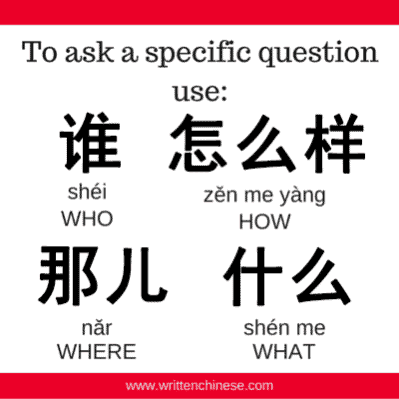
Examples:
谁在那唱歌? (shéi zài nà chàng gē?) = Who is that singing?
你喜欢什么样的电影呢?(nǐ xǐ huan shén me yàng de diàn yǐng ne?) = What kind of movies do you like?
Sometimes, we can omit the interrogative pronoun but use the modal particles, such as 呢 and 啊 for specific interrogation.
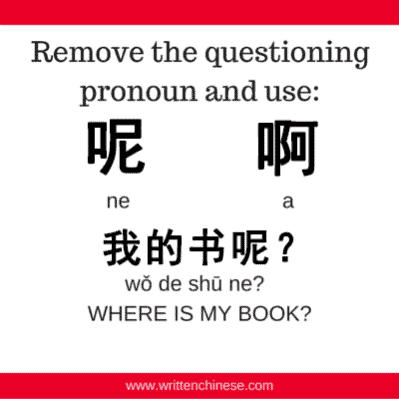
Examples:
我的书呢?= 我的书在哪里? (wǒ de shū ne? = wǒ de shū zài nǎ lǐ?) = Where is my book?
我喜欢喝茶,你呢?= 你喜欢喝什么? (wǒ xǐ huan hē chá, nǐ ne? = nǐ xǐ huan hē shén me?) = I like to drink tea, and you?
In addition, we will use 多+ adj to ask length, area, time, etc.
Examples:
你家到公司有多远?(nǐ jiā dào gōng sī yǒu duō yuǎn?) = How long is it from your home to the company?
你穿多大的衣服? (nǐ chuān duō dà de yī fu?) = What size clothes do you wear?
3) 选择问句 (xuǎn zé wèn jù) Alternative question
For 选择问句 (xuǎn zé wèn jù) we will use (是)…还是… to connect two or more than two options, and ask others to choose one of them to answer. The commonly used modal particles in the end of this kind of sentence are 呢 and 啊.
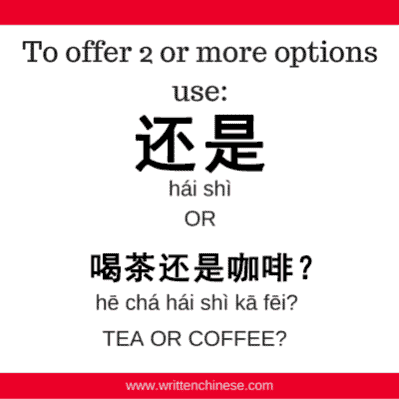
Examples:
喝茶还是咖啡? (hē chá hái shì kā fēi?) Tea or coffee?
你今天去图书馆还是明天去? (nǐ jīn tiān qù tú shū guǎn hái shì míng tiān qù?) = Will you go to the library today or tomorrow?
你喜欢红色,蓝色还是黑色? (nǐ xǐ huan hóng sè, lán sè hái shì hēi sè?) Which color do you prefer, red, blue or black?
4) 正反问句 (zhèng fǎn wèn jù) A-not-A question
A-not-A question is made up of both the affirmative and negative answer. The response should be one or the other.
Examples:
你来不来? (nǐ lái bù lái?) = Will you come or not?
你吃饭了没有? (nǐ chī fàn le méi yǒu?) Have you eaten or not?
这条裙子好看不? (zhè tiáo qún zi hǎo kàn bù?) Is the dress beautiful or not?
你没去过泰国,是不是? (nǐ méi qù guò tài guó, shì bú shì?) You haven’t been to Thailand, is that true?
Special Sentence Type: Rhetorical questions
Rhetorical questions use the form of Interrogative sentences and the rhetorical tone to express emphasis. Rhetorical questions often use the form of yes-no sentence and specific interrogation.
Examples:
不是…?
这本书不是买过了吗?= 这本书已经买过了。 (zhè běn shū bú shì mǎi guò le ma? = zhè běn shū yǐ jīng mǎi guò le.) Hasn’t this book already been bought?
哪儿/哪里/怎么 + 能/会/…?
刚刚说过的,怎么会忘记? =不应该忘记。 (gāng gang shuō guò de, zěn me huì wàng jì? = bù yīng gāi wàng jì.) = You have just been told, how could you have forgotten?
难道…(吗)?
难道你没有告他吗?= 你应该告诉了他呀。 (nán dào nǐ méi yǒu gào tā ma? = nǐ yīng gāi gào su le tā ya) = Didn’t you tell him about it?
祈使句 (qí shǐ jù) Imperative sentence
An imperative sentence 祈使句 (qí shǐ jù) requests another other to do or not to do something. There are two main types of imperative sentence:
1) Order or Ban
Examples:

禁止吸烟! (jìn zhǐ xī yān) = No smoking!
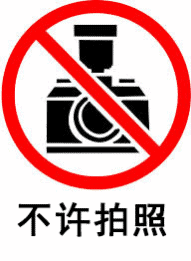
不许拍照。 (bù xǔ pāi zhào) = No cameras.
快去睡觉。 (kuài qù shuì jiào) = Go to sleep..
2) Ask or dissuade
Examples:
(您)请坐 ((nín), qǐng zuò) = Take a sit, please.
请等一下(qǐng děng yī xià) = Please wait.
我们开始吧。 (wǒ men kāi shǐ ba) = Let’s begin.
In some special situations, one noun words or noun phrases can also make up an imperative sentence.
Examples:
水!(=给我水!) (shuǐ! = gěi wǒ shuǐ!) = Water! (= Give me water!)
感叹句 (gǎn tàn jù) Exclamatory sentence
Exclamatory sentences 感叹句 (gǎn tàn jù) are used to express strong feelings of emotion such as happiness, sadness, anger, fear or surprise). In spoken Chinese, expressions such as these are emphasised with a downward tone at the end of the sentence.
1) Exclamatory sentence can be made up of interjection.
Examples:
哇!这朵花真美! (wā! zhè duǒ huā zhēn měi!) = Wow! These flowers are beautiful!
唉, 真的别无选择! (āi, zhēn de bié wú xuǎn zé!) Well, there is no other choice!
2) Noun + 啊!
Examples:
天啊!(tiān a!) My God!
3) Slogan or Congratulations
Examples:
为我们的健康干杯! (wèi wǒ men de jiàn kāng gān bēi!) = Let’s cheers to our health!
Use an Adverb or Modal Particle to end a Sentence.
Sometimes an adverb such as 多,多么, 好, or 真 can be used with a modal particle, such as 了, 啊 and 呀.
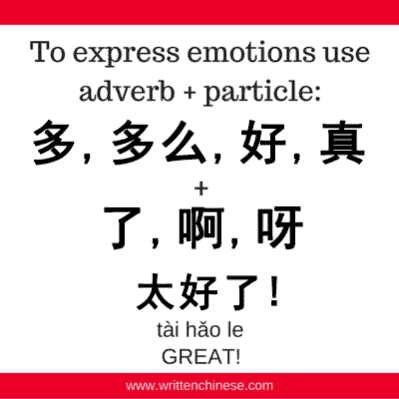
Examples:
太好了! (tài hǎo le) = Great!
真没劲! (zhēn méi jìn) = So boring!
多可爱的小孩啊! (duō kě ài xiǎo hái a!) What a lovely kid!
好冷的天气呀! (hǎo lěng de tiān qì ya!) It’s so cold!
If you’ve got any questions or comments to make about this article please leave us a message below. Don’t forget to read our previous article about Chinese Sentence structure.
